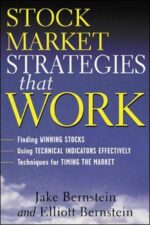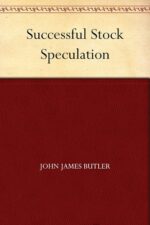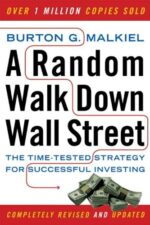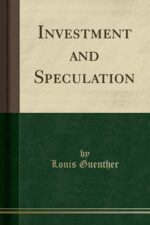All About Index Funds: The Easy Way To Get Started
$15.90
All About Index Funds clearly explains why investing in index mutual funds is the only reliable winning strategy. Ferri compares and contrasts active mutual funds with index funds in a way that even a novice will have no trouble navigating. Once you read this book, you will no longer listen to the hype from Wall Street stockbrokers and their analysts who are paid to make money from you, not for you.
Introduction:
All About Index Funds is divided into three parts. All three sections are written to help investors at all levels of experience. The sections can be read independent of each other or from one to the next. Part I explains what a market index is and how index mutual funds work. There is a short history of the index fund industry, including a chapter devoted to new exchange-traded funds. Part I also highlights the performance advantages that index funds have over other types of investments.
Part II categorizes the broad spectrum of index funds based on type and style. Many people are aware of the big index funds, such as S&P 500 index funds, but don’t know that there are hundreds of index funds covering a variety of markets. There are funds tracking the bond market, international stock, industry sector markets, bond markets, commodities market, and currency market. New funds are formed every month, and as the number of funds continues to grow, the cost of investing in those funds continues to fall.
Part III of the book is all about using index funds in your portfolio. To help with this decision, there are chapters on forecasting market returns, asset allocation, risk control, and retirement planning. Several model portfolios are introduced.
All About Index Funds is a guidebook for new index investors and a reference for more experienced investors. The book was written to provide more than enough information to build and manage a quality index fund portfolio. There are a few words of caution before we proceed. Converting to an index fund portfolio does not guarantee positive returns every year. No viable investment strategy can do that. You must be patient. In the long-term, a well-diversified index fund portfolio will make you more money with less risk than any other popular investment method. This is a guarantee. Index funds cost far less than other types of mutual funds, so eventually the laws of economics will take over and index funds will deliver higher returns.
There is one other important point to remember. For any indexing strategy to be truly effective, you must build the right mix of index funds for your needs and wait patiently for the markets to do their magic. If you stick with a well-managed strategy for several years, the fruits of the marketplace will come to you. It is in the long run that index funds truly shine. All About Index Funds is all about a simple and effective lifelong investment strategy that just plain works.
Contents:
- Index Funds Explained
- Why Index Funds Beat Most Other Funds
- The History Behind Indexing
- Exchange-Traded Funds
- Tax Advantages of Index Funds and Exchange-Traded Funds
- Broad U.S. Equity Market Funds
- U.S. Sector Equity Funds
- Global and International Equity Funds
- Alternative U.S Equity Funds
- Investing in Bond Index Funds
- Commodity and Currency Funds
- Forecasting Index Fund Returns
- Asset Allocation Basics
- Defining Your Financial Goals
- Designing Your Index Fund Portfolio
- Managing an Index Fund Account
All About Index Funds: The Easy Way To Get Started By Richard A. Ferri pdf
| Author(s) | |
|---|---|
| Format | |
| Pages | 338 |
| Publication Year | 2007 |
20 reviews for All About Index Funds: The Easy Way To Get Started
Only logged in customers who have purchased this product may leave a review.










Eliza Beltran (verified owner) –
Great book to gather an understanding of index tracker funds
Eliel Frye (verified owner) –
I’m a total noob to the market and investing but this book explained so much. I think its a must read for anyone looking into investing for their future and have no idea where to start.
Jazmin Estrada (verified owner) –
I have taken advantage of the latest market volatility to confirm my long-term financial strategy. I ordered several books from sacred traders on asset allocation and using low-cost index funds or ETFs for investment.
Rick Ferri’s books (I also ordered his new ETF book) are well-researched, complete guides to sensible, long-term investing. He avoids the fads, and provides information in clear, understandable terms without all of the emotional “hype” present in many books about the capital markets.
In my opinion, Mr. Ferri’s prior books (and the articles he has published in journals for financial professionals) have made me a better investor.
I highly recommend All About Index Funds.
Elisha Stevens (verified owner) –
Outstanding book, very informative.
Phoenix Escobar (verified owner) –
Rick Ferri has done it again. This is a wealth of information packed into 300+ pages. It makes for a great read and then a really good reference work. For price/value it cannot be beat!
Jovie Walters (verified owner) –
Item was as described. Thank you.
Katherine Keller (verified owner) –
Execellent book on index fund. Anybody who wants to get into passive investing, this is the book to get. An easy read.
Maisie Shannon (verified owner) –
If your using a agent , you might check this out to reduce your fee’s. Even tho it was published in 2006 it is still valuable.
Carolina Romero (verified owner) –
Could use some editing, for example, the front cover talks about EFTs when obviously they mean ETFs.
The information contained inside is solid though.
Magnolia Enriquez (verified owner) –
They should teach about index funds in high school. I have purchased this book and given it to family members.
Alaric Romero (verified owner) –
A bit repetitive but gives great examples and is a good reference for investing.
Colson Parrish (verified owner) –
Excellent book but needs another updating as more diverse types of index funds have become available since its last update.
Raya Norman (verified owner) –
Written well enough, a family member recommend I buy this book, I did, and now know more options for investing my money.
Tiana Acosta (verified owner) –
Not worth your time reading. This is old ideas that are not relevant in the 2000s.
Try another book. The “All About” series of books in below the information in the “___blanK____ for Dummies” books.
Aubree Peterson (verified owner) –
I love Richard Ferri’s books. This is one of them.
If you are clueless about financial investment and want to get started on it, then read this book. Also recommended are All about Index Funds, Serious Money, and The ETF Book. Unlike books that promote sales pitch and sell garbages like (IBD: Investor’s Business Daily or even Wall Street Journal) Ferri provides sound studies done on investment strategies, sound strategies, expectation and mindset.
Jensen Drake (verified owner) –
After reading most of the available books on index funds, and many of them give both the reasoning for, and the advantages of, investing in such funds, I believe this latest one is the best of the bunch. It provides not only the various powerful arguments for such investing, but also suggests specific portfolios of index funds for different classes of investors.
Although each investor has his or her own individual situation, which must be carefully analyzed before any investment plan is generated or changed, Ferri’s book is a good guide toward making the best choices.
After studying the various investment choices available to the individual investor, I have concluded that unless the investor has some really specific and unique knowledge of any particular company, or possiby industry, investing in individual stocks or bonds can be highly speculative. Investing in mutual funds provides some degree of diversification, but most managed (not index) funds show a long term return which is significantly less than that of index funds, and those few managed funds that have “beaten the average” in the past, generally do not continue to do so. Moreover, the 1% or more of expense ratio of managed funds takes a really big bite over time when the compounding interest effect is taken into account.
Santiago Goodman (verified owner) –
I enjoyed this book as it provided good all round coverage on the topic. It starts you off with a concise overview and then straight into a history lesson, moving on into the tax advantages and why this occurs before covering off the types of Index funds and ETF’s and how to invest. The only slight criticism is that in the fast moving world of Index funds and ETF’s this edition is now 4 years old and in some areas it shows. I would probably advise checking out other books on this topic that are more up to date especially with information on how Index funds and ETF’s performed after the 2007/2008 bear market.
Ricky Atkinson (verified owner) –
Takes the individual investor through the gambit on index funds, with solid information that is genuinely useful, whether you’re investing in an IRA or a cash account. Will also help you in selecting the appropriate investments for your 401K. As with all minimally speculative investing, returns grow over time. If you’re interested in high return, overnight strategies, this is not for you. Conversely, if you wish to follow Warren Buffet’s advice (he strongly feels index funds are an ideal investment – especially for the individual), you should read this. I strongly recommend this to anyone who has 10+ years of investing – whether in a retirement plan or a taxable plan.
Aziel Rose (verified owner) –
I have been doing a self-study on investing topics this year and previously read several books on indexing by Jack Bogle [my hero, and an erudite writer], and Morningstar’s Christine Benz [Clear and concise], but I think this is my favorite. Ferri is laser sharp in explaining investing concepts, and reads like you are learning one-on-one from an excellent business school professor. I bought this book because I had already read his also excellent book on asset allocation. This would be a perfect book if it was better edited. The text and content is fine but there are typos, repeated words, etc. Ferri’s work deserves better, but I still very highly recommend the book.
Jayleen Howe (verified owner) –
I value Richard Ferri’s books and this one is no exception. While the writing is easy to grasp, it is most complete. The book covers just about everything you need to know to master investing in index funds or ETFs.
Although the book is not about allocation (Ferri has a great book on that subject), it does discuss it. He shows how to actually cut risk by using a more aggressive approach.
I found the history of index funds most interesting. But I also appreciated the discussion of tax advantage in indexing, the different benchmarks, bonds and commodities.
This book can make you money if you read it, study it and apply it to your own investing. The more you know about and understand index funds and their close kin, ETFs, the better able you will be to profit by using them.
Highly recommended.